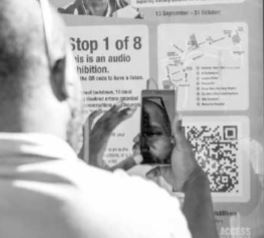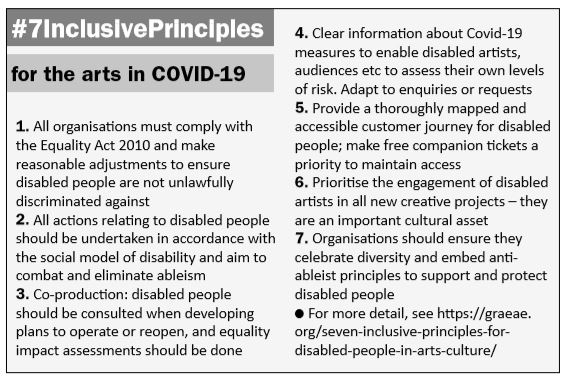Covid-19 and the lockdowns that have followed nationally and internationally have caused uncertainty for organisations and individuals in all areas of the arts. The full financial impact for many self-employed artists and freelancers is yet to be seen, and opportunities for creative development are undoubtedly stifled for the foreseeable future.
For those in the arts who have a learning disability and who are already used to a lack of opportunities within the arts industry, the coronavirus pandemic could have major consequences. In the extraordinary times that we have experienced, the creative learning-disabled community has had to grasp an uncertain future, both professionally and personally.

The drastic impact on everyone’s social and cultural lives has led to a greater use and reliance on email, social media and video conferencing platforms such as Zoom, Facetime and Skype to connect with others and present new material. Theatre and dance classes that would normally be attended as part of a day service or college course have often been replaced by a weekly virtual class online that offers a lifeline for social communication and contact. Yet there are barriers when it comes to how accessible these platforms are for people with learning disabilities, even though many organisations adapted quickly to offer online opportunities.
For people with learning disabilities – as with many in society – technology may not be readily available, and the isolation and motivation that online classes require are not suited to everyone. One east London theatre company set up a free 90-minute audio exhibition – Still, Here – which explored the challenges that the learning-disabled community were facing.
Access All Areas usually stages productions performed by learning disabled and autistic actors but, faced with the difficulties of closed theatres and social distancing, it organised an innovative project, creating a “soundwalk” around the London borough of Hackney,
with eight stops, each lasting 5-10 minutes (www.accessallareastheatre.org/ stillhere). Audience members could use their smartphone to scan a QR code and access the audio recording.
Everything was recorded by the artists at home on their phones or tablets and included reflections on life for people living with a disability in London.
Helen Bryer and Adam Smith, who created the exhibition, told local newspaper Eastlondonlines that they had intended to create something that “reminded the local community that learning disabled and autistic people are literally still here; they are still being creative and still supporting each other”.
When venues reopen
While innovative ways of working within the performing arts and examples of new ways of creative working emerge, it is important that the future is inclusive for all those in the creative industries. With the likelihood of things returning to “normal” appearing to be further away than anyone imagined, a way forward that ensures that the needs of people with learning disabilities do not fall under the radar is essential.
In September, seven principles for the inclusion of disabled people in a postCovid arts world were issued. Launched by a coalition including deaf, neurodiverse and disabled arts organisations, the #7InclusivePrinciples guidance aims to ensure that people with disabilities are not discriminated against when venues began to reopen following the Covid lockdown.
Andrew Miller, the UK government disability champion for arts and culture, said to The Stage in May: “Coronavirus threatens not only the existence of our national culture as we’ve known it but also the health, creativity and civil rights of disabled people… it is essential we come together as one creative disabled community to ensure we are not left behind, but instead shape and reset the coming cultural recovery inclusively.”
It seemed that people with learning disabilities were beginning to make their mark on the film and TV industry early in 2020, with performances in mainstream film, theatre and TV. It is important that opportunities for them in these industries are not lost in 2021, and that nationwide initiatives continue to support and develop their skills. 
